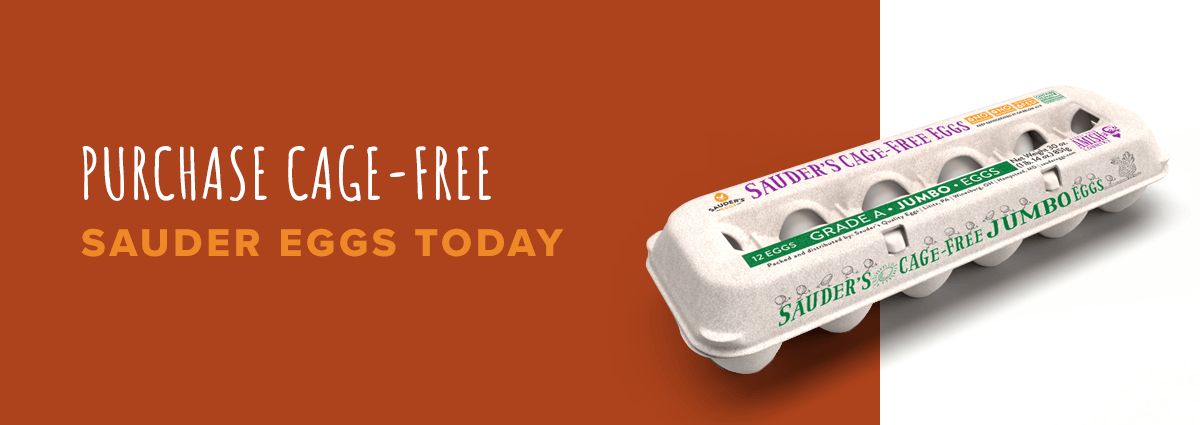What Do Cage-Free Eggs Really Mean?
Posted on: November 21st 2022
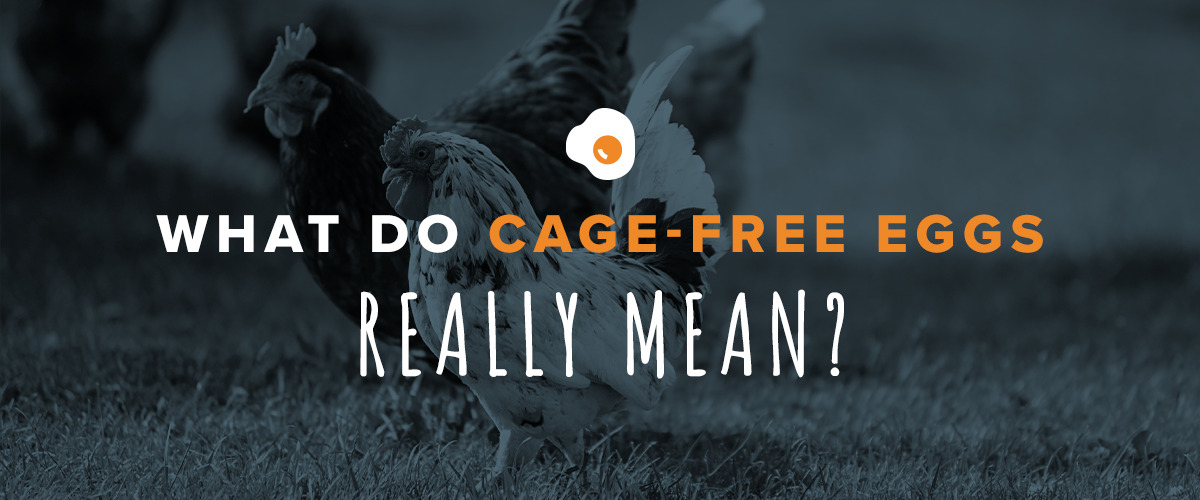
With all the different labels to learn about and keep track of, shopping for eggs can get confusing. On top of this, many consumers worry about the care egg-laying hens receive during their lives. While many companies do little to improve their hens’ well-being, you can reference some labels to find out how the farm treated your egg hens.
Whether you’re interested in the humane treatment of chickens or want to know more about your eggs, we’ve got you covered. Read this article to learn the meaning of cage-free eggs and other labels you might see in your grocery store. We’ll review battery-cage, cage-free, free-range, pasture-raised, and organic and what each label means for you and the hens who laid your eggs.
Battery-Cage Eggs — The Norm
Battery cages are the most common housing form for U.S. chickens. Around 88.5% of all hens in the U.S. are in caged housing. Unfortunately, most of these hens live limited lives — however, some farmers like Sauder have employed strict care standards to ensure their battery cage hens still live rich, happy lives in these facilities.
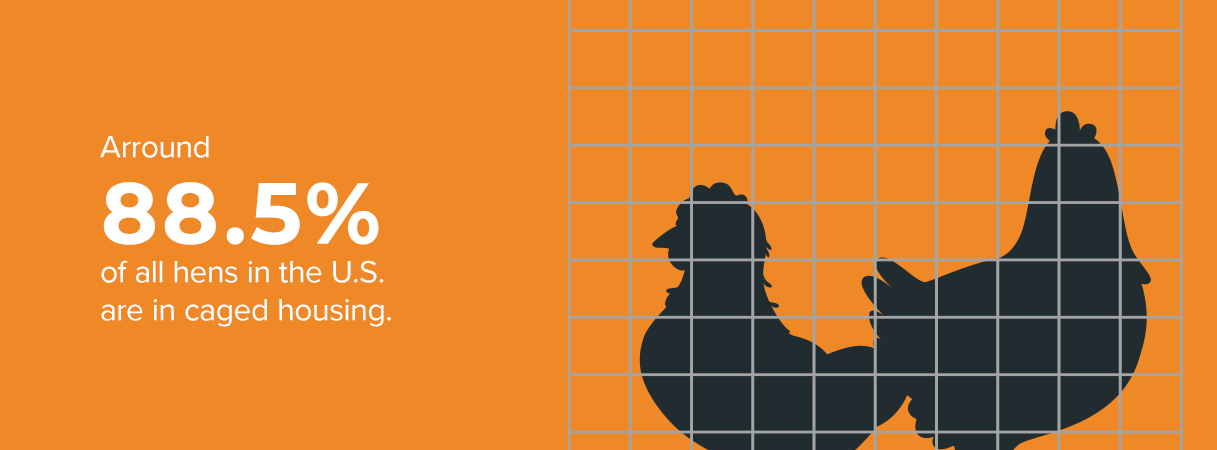
Battery cages are the easiest way for many groups to house their hens, since separating them in cages helps prevent aggression and problems among the birds. Battery cages have sloped flooring, allowing eggs laid by hens to roll down to the front of each section for easy collection. Since all the birds live in cages, they aren’t running underfoot all the time, which makes egg collection and hen care much more convenient for farmers.
At Sauder, our traditional eggs are United Egg Producers certified. Our farms with battery cages provide chickens with continual fresh air, plus room to move around, socialize with other chickens, and take dust baths. Earning this certification means our farms have a zero-tolerance policy toward willful neglect and abuse. Hens living in battery cages on our farms have the best possible, most humane conditions in their space.
Cage-Free Eggs Compared to Battery-Cage Eggs
Cage-free spaces tend to provide birds with much more room than battery cages. A member of the United States Department of Agriculture’s Quality Assessment Division must verify cage-free eggs. This verification ensures cage-free hens live in conditions that meet stringent standards. Cage-free hens live in open areas and have more room to socialize with other chickens. They can roost and lay eggs in more natural conditions than caged birds.
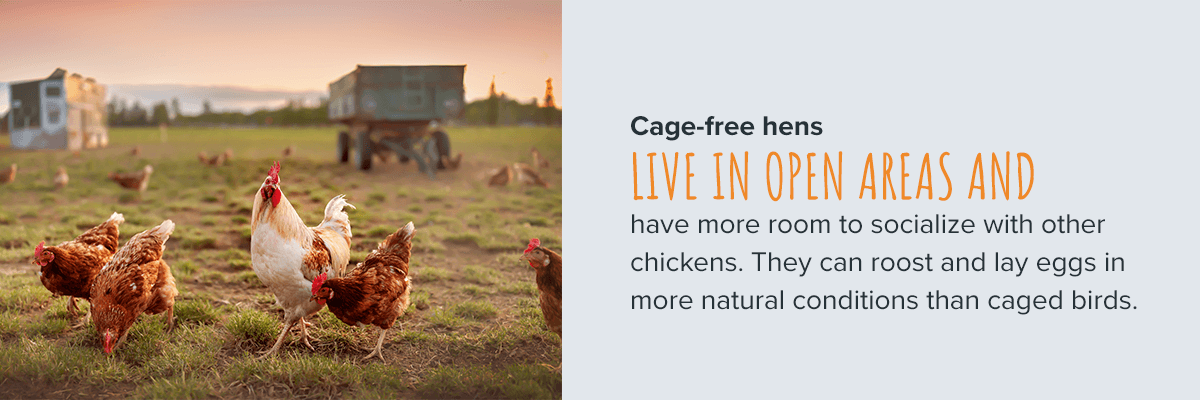
Cage-free conditions have a few downsides compared to battery cages. Since they have plenty of space to move, birds have more opportunities to spread aggression and disease. Additionally, eggs gathered from cage-free conditions have more chances to collect dirt and salmonella, since farmers don’t use the same convenient, clean harvesting process as they do with battery eggs. Sauder overcomes this by carefully washing and transporting harvested eggs to ensure they remain contaminant-free.
To qualify as cage-free, birds must live in a space that provides them with room to roam while they’re in their laying cycle and offers them unlimited access to their water and food. Cage-free birds have unlimited access to their housing space, though this area isn’t necessarily outside. These spaces are usually open areas or rooms like poultry houses and barns. As long as the hen facilities provide the above requirements, these housing areas are cage-free.
What’s the Difference Between Cage-Free and Free-Range Eggs?
“Free-range” is another USDA term. Livestock products labeled “free-range” must raise hens outside or provide them with access to the outdoors. There aren’t regulations around how long the hens should be outside, but all free-range birds have more access to the outdoors than cage-free hens. Cage-free and free-range chickens live in open spaces with other birds, where they can move around and stretch their wings.
Sauder free-range eggs are Certified Humane Free-Range. This certification comes from the Humane Farm Animal Care Program, a group that works to promote and protect livestock health and safety. Certified Humane standards dictate the space, litter, air, light, perches, enrichments, and more that hens receive in their housing.
While USDA standards don’t define free-range outdoor time, Certified Humane standards do. Standard free-range hens don’t necessarily have to have allocated outside time — but they need to have potential access to the outdoors. At Sauder Eggs, we believe in fair and humane animal treatment — that’s why our free-range eggs are Certified Humane Free Range.
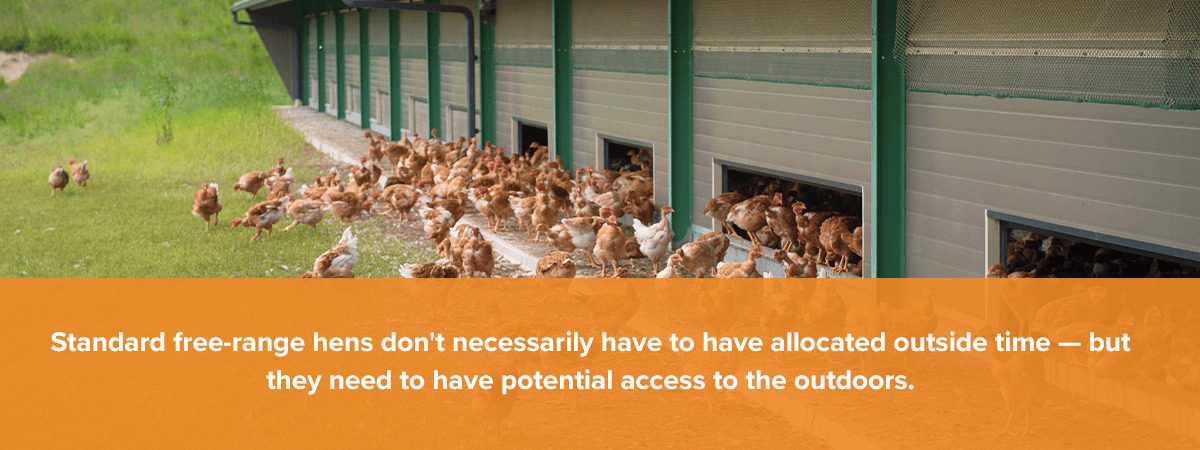
To achieve this certification, hens must have two square feet of outdoor space per chicken and at least six hours of outside access, allowing them to get plenty of sunlight and fresh air. Non-certified free-range birds have no minimum outdoor time requirements and might see much less outdoor time than consumers believe.
What’s the Difference Between Cage-Free and Pasture-Raised Eggs?
“Pasture-raised” is not a USDA-regulated term like “cage-free” or “free-range.” It doesn’t mean the hens live in better conditions than cage-free or free-range hens, though many facilities with pasture-raised eggs attempt to provide their birds with more outdoor space. Often, this term applies to smaller family farms that let their hens roam in pastures during the day and house them in barns at night.
While “pasture-raised” on its own isn’t government-regulated, pasture-raised eggs typically come from hens kept in top conditions. These hens get access to regular sunlight and outdoor space. Since they’re pasture-raised, these birds get their regular feed, supplemented with natural insects, grasses, and seeds. They have room to roam and graze as they would in the wild, providing you with delicious, open-area-reared eggs.
What’s the Difference Between Cage-Free and Organic Eggs?
The term “cage-free” only describes the birds’ living conditions, while “organic” relates to the food hens eat and how they live. Cage-free birds live in open areas — organic eggs have slightly stricter requirements.
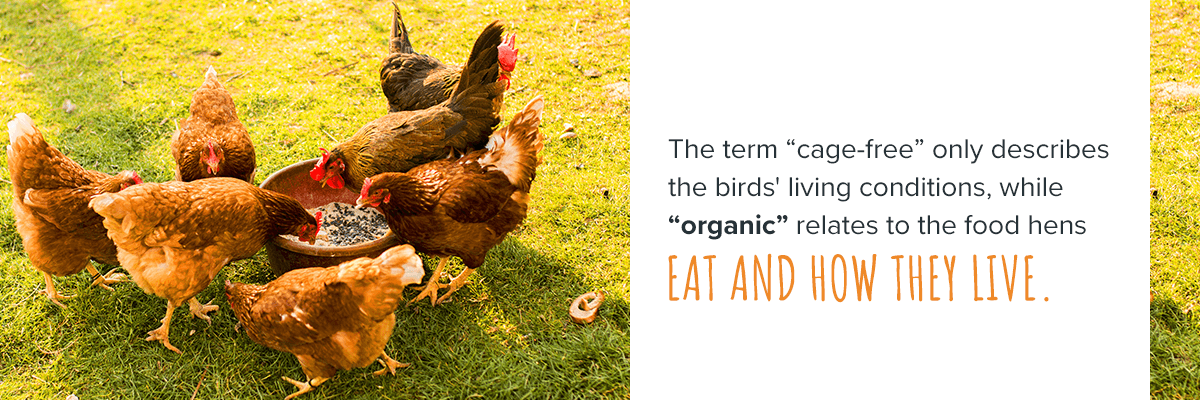
To achieve the USDA’s organic certification, hens must live in cage-free conditions with some access to the outdoors. Birds must also eat organic feed, which is free from conventional fertilizers or pesticides. Additionally, these hens cannot eat synthetic preservatives, GMO-derived products, antibiotics, or animal byproducts. The land the hens live and roam on must be free of applied prohibited substances for three years before organic farmers can use them for livestock.
Sauder organic eggs take this one step further. Our organic eggs are Pennsylvania Certified Organic and Ohio Certified Organic. Our organic eggs meet higher standards than USDA-only organic eggs, giving our customers even better reassurance of hen treatment at our farms. Our birds have year-round access to direct sunlight, exercise areas, outdoors, shade, shelter, and more. They receive excellent care and only eat high-quality, organic feed.
Why Cage-Free Eggs Matter
While battery cages help reduce hen aggression and allow for easier egg harvesting, they still keep the birds in more restrictive conditions than cage-free birds. When you buy cage-free, free-range, pasture-raised, and organic eggs, you can feel confident that the chickens enjoyed having more space. While the convenience of battery cages is undeniable, many consumers want eggs from hens who had the freedom to do their natural, instinctive activities.
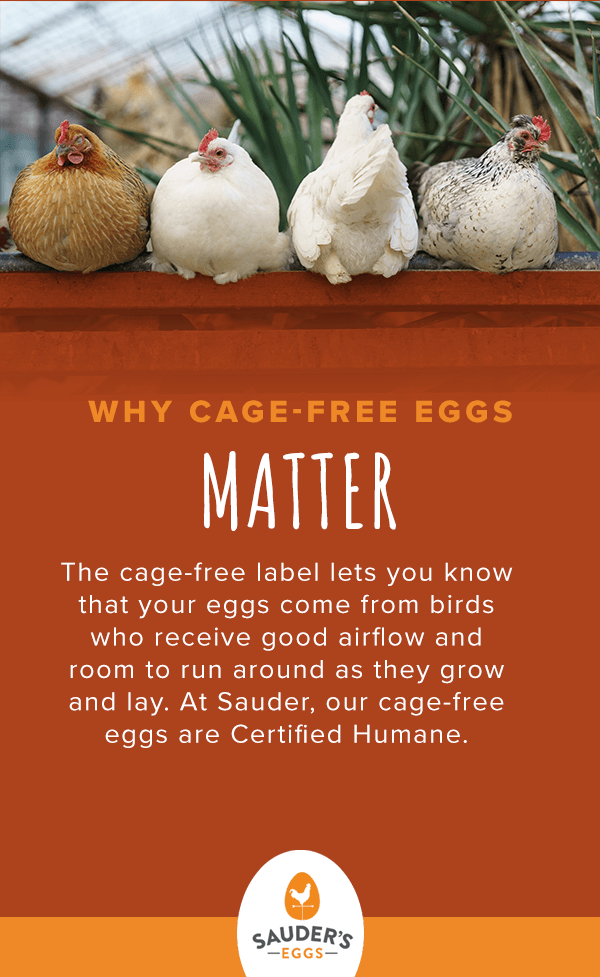
In recent years, there’s been high demand for eggs from hens raised with better nutritional standards and more space to roam. Cage-free, pasture-raised birds can supplement their diets with seeds, insects, and grass, which meet their natural dietary needs better and result in healthier, richly colored eggs.
The cage-free label lets you know that your eggs come from birds who receive good airflow and room to run around as they grow and lay. At Sauder, our cage-free eggs are Certified Humane.
Cage-free, Certified Humane eggs come from hens who live in open facilities with 1.5 minimum square feet per bird. These standards limit the number of birds in a facility to ensure they all have enough space to roam, lay, and play. Hens must have enrichment opportunities like dust baths and perches, and their air and litter must meet specific cleanliness standards. Emphasizing cage-free, Certified Humane eggs is essential to promoting animal health and care as we rely on chickens for egg production.
Are Cage-Free Eggs More Expensive?
Since cage-free, free-range, pasture-raised, and organic eggs all involve more space and healthier feed, these eggs cost more than traditional eggs. Feed can be an expensive part of raising chickens — the higher the quality of the feed, the more it will cost to run these livestock operations. Additionally, cage-free and other cage-less hens receive more space, which means fewer chickens or higher land costs for bigger pieces of land to house the chickens on. More land requires more people and time to maintain everything, which also contributes to costs.
Finally, cage-free eggs are more expensive overall because more work goes into providing the hens with extra space, specially formulated feed, and additional enrichment. Providing a high quality of life for hens costs more money, so their eggs will be more expensive. When they buy cage-free eggs, consumers trade more money for healthier, happier, and more humane living conditions for chickens.
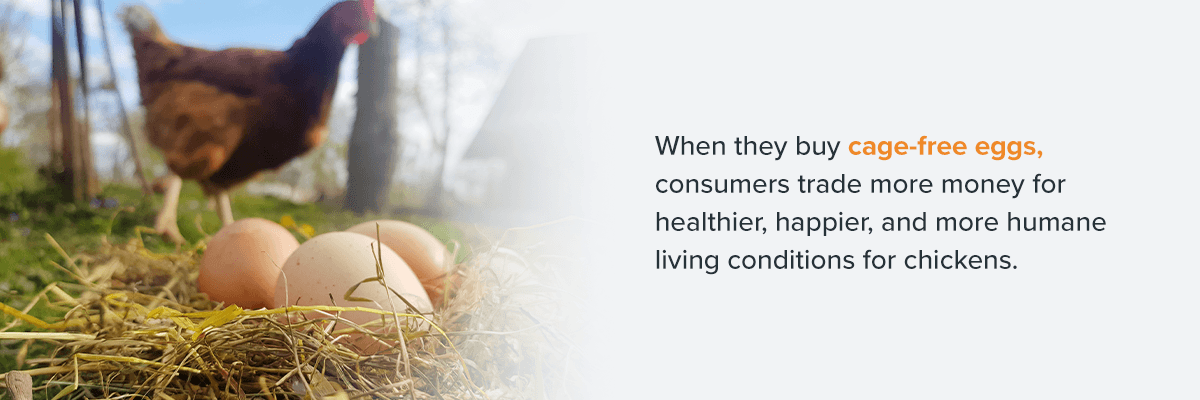
Are Cage-Free Eggs Healthier?
The science around egg-rearing health is a bit murky. Some studies have shown that free-range eggs have a higher fat content, while pasture-raised eggs are richer in fatty acids and vitamin E. However, for the most part, it seems the nutritional differences between caged and cage-free eggs are minimal. The most significant difference in these eggs is the quality of life the hens receive. Cage-free and pasture-raised hens often lead less restrictive lives, with room to perch, dust bathe, and lay their eggs.
Eggs are already nutrient-rich, but the best way to ensure you’re getting the most out of your eggs is to look for eggs from hens who have had access to nutritionally dense feed. This specialized food makes hens’ eggs healthier and further enriches them with essential nutrients. At Sauder Eggs, we feed our pasture-raised chickens Sauder’s Gold Feed, loaded with vitamin D, omega 3, and lutein for better, healthier eggs.
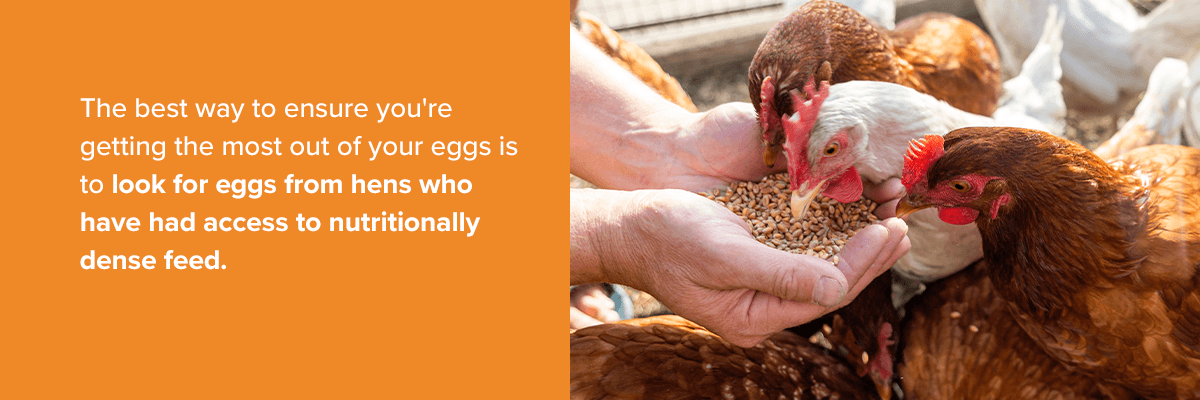
Understanding the Labels
Sometimes labels can be confusing and misleading — not every label has the backing of government regulations or strict third-party standards. How can you know for sure what you’re getting?
Cage-free, free-range, and organic are all designations regulated by the USDA. Hen conditions must meet USDA standards to receive these certifications. Typically, a USDA representative will visit facilities once a year to verify the conditions and treatment of a facility’s birds. However, these labels are somewhat vague, especially regarding outside time and enrichment for hens in these facilities.
In addition to government-regulated labels, third-party labels often have stricter standards of care for hens than USDA regulations. If you spot a Certified Humane label, you can feel confident that an inspector has verified the hens’ living conditions and confirmed they meet the standards of the Humane Farm Animal Care Program. Reviewing these third-party labels can help you learn more about the conditions hens live in and will allow you to become better informed about your food.
The egg industry is large, and some farmers label eggs to make them sound better to consumers without any actual backing or standards behind them. You’ll want to do your research and keep an eye out for potential buzzword labels that don’t have clearly documented standards behind them. Some of these labels are as follows.
Pasture-Raised
As mentioned above, “pasture-raised” isn’t a government-regulated term. Still, many pasture-raised eggs are from smaller farms that emphasize hen care. Look at the company producing these eggs — do they have other labels like “Certified Humane” that come from reputable organizations with high standards of bird care? Are they transparent about how they source their eggs and the quality of the farms they work with? Check out their website to learn more about their pastured eggs and treatment standards.
Natural
This label is tricky. While “natural” eggs must have minimal processing and no artificial ingredients, there are no standards of care for natural eggs. The USDA does not regulate farm practices for the “natural” label, so hens could still live in poor conditions. Additionally, the USDA’s “natural” label only applies to meat and poultry, not other foods.
No Added Hormones
This label holds little weight for poultry products. Since the U.S. government prohibits the use of steroid hormones in poultry products, your eggs and egg-laying hens never had steroid hormones given to them in the first place. However, farmers sometimes inject birds with medication to reduce rates of disease. If you want to avoid eggs from hens who may have received antibiotics, look for packages that clearly state they’re “antibiotic-free.”
Non-GMO
This label means the hens have not received feed made from genetically modified organisms. While some consumers dislike the idea of GMOs, this is entirely a matter of buyer preference. While the label helps you identify the type of feed used for the hens, it has no effect on how the farming facility treats birds. You can purchase eggs from facilities with less humane hen treatment that still doesn’t feed them food with GMOs.
Other labels to look for on your eggs are “UEP Certified,” “Animal Welfare Approved,” and “Organic.” These labels come from third-party or government groups that maintain specific standards for animal care. Additionally, knowing where you’re getting your eggs from can help you identify which eggs are from reputable, humane farms. Look for Sauder eggs with Certified Penn labels for guarantees of high Pennsylvania farm standards.
What Type of Egg Should You Choose?
The egg you choose will depend on your preferences and budget. The stricter the standards of care for hens, the more expensive their eggs will be. You’ll find yourself spending an extra dollar or two for a dozen pasture-raised and organic eggs. This price increase accommodates the extra space and organic food these hens receive.
You might also choose pasture-raised eggs because you worry about the space and sunlight the hens laying your eggs receive. Small, local farmers who can devote more time and care to their flock often run pastured farms. At Sauder, our hens have high-quality, humane treatment regardless of bird-housing conditions. We emphasize our relationships with family farms that provide their birds with the best care.
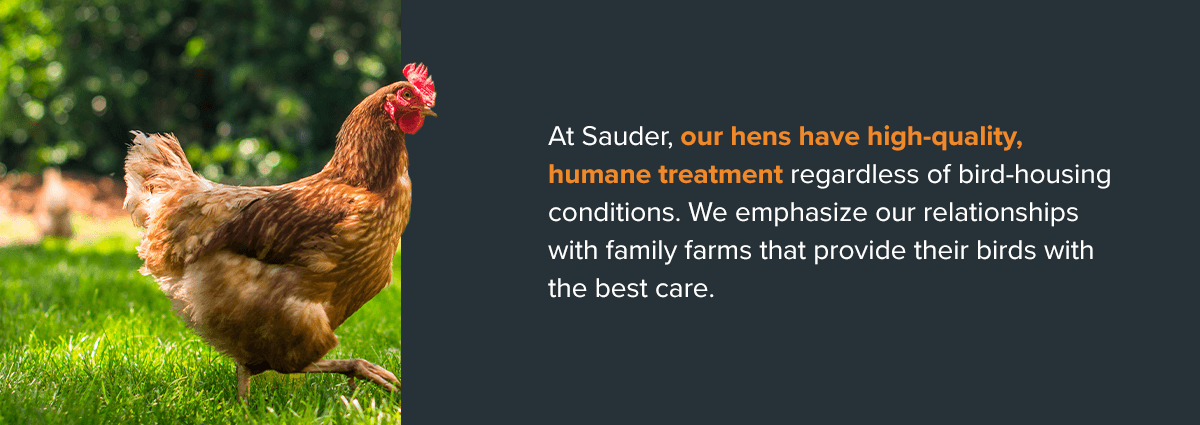
Ultimately, you should choose the egg that best fits your budget and taste preferences. Sauder Eggs carries a range of eggs from different housing styles, giving our buyers control over their purchases and offering them a say in their hens’ lifestyle. All our eggs come from hens kept in humane conditions — pick the egg and housing type you think is best.
Sauder’s Cage-Free Eggs
Sauder Eggs carries several cage-free types of eggs. We work within government regulations and third-party standards to ensure the hens that lay our eggs receive humane care during their lives. Our cage-free, free-range, and organic eggs all meet government or Certified Humane standards of bird treatment. We work closely with family-owned farms to ensure hens receive the best care during their lifetimes.
Our pasture-raised eggs come in biodegradable, recyclable, and compostable cartons. Hens raised on pastures have access to plenty of fresh air and outdoor time, allowing them to graze and roam in natural conditions. Additionally, farmers provide them with Sauder’s Gold Feed, an antibiotic feed that further improves these birds’ health.
Purchase Cage-Free Sauder Eggs Today
At Sauder, we believe in the humane, transparent treatment of the hens that lay our eggs. All the farms we partner with receive yearly third-party audits, and all our eggs must meet UEP or specialty egg certifications. If you’re curious about the farm and its treatment of its birds, you can use our farm code lookup to see where your eggs are coming from.
Sauder works closely with our farmers to deliver every egg fresh to your grocery stores. We guarantee the highest care standards for our birds, and all of our farms exceed USDA regulations for their hens. We believe in humane, quality hen treatment and work to provide enriching, comfortable lives for every hen who lays our eggs. You can purchase Sauder Eggs knowing our hens lived happy lives and had all their needs met at our family-owned facilities.
Enjoy healthy, humane products when you buy from Sauder Eggs. To shop our organic, cage-free, free-range, pasture-raised, or traditional eggs, find a store near you today!
